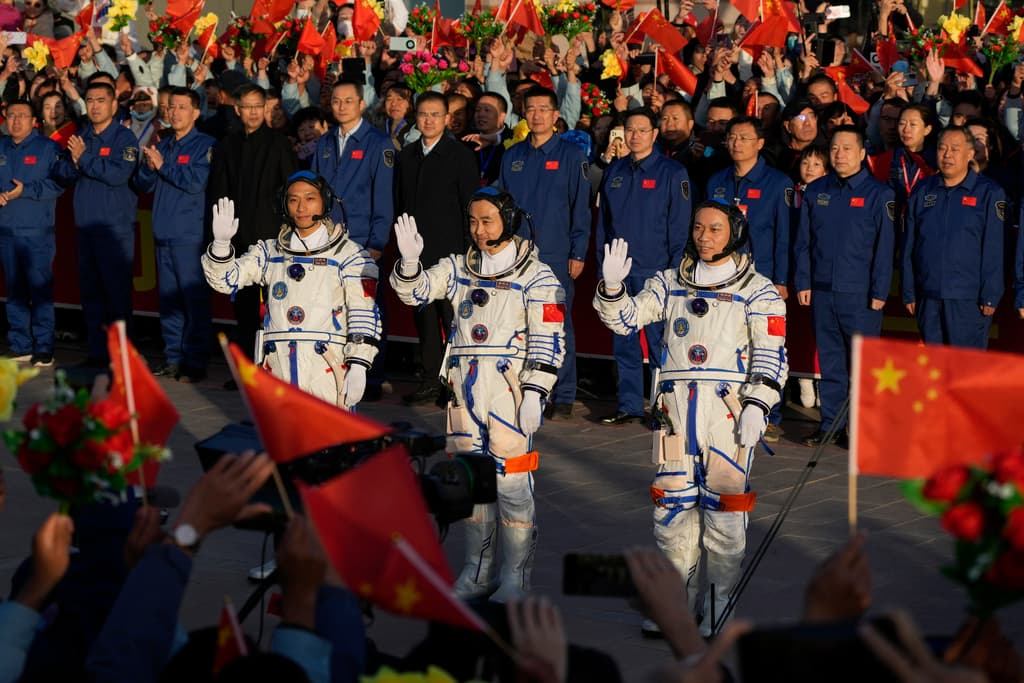Communist China Is ‘Moving at Breathtaking Speed’ in the Heavens, America’s Space Command Warns
Beijing makes great leaps forward in their off-world ability to target America’s economy and defense.

Communist China is ramping up its military capabilities far above our heads. The commander of the United States Space Command, Lieutenant General Stephen Whiting, warns that Beijing has made great leaps forward in their off-world ability to track and destroy assets vital to America’s economy and defense.
General Whiting told the Space Symposium last week that Communist China “is moving at a breathtaking speed.” “They’ve more than tripled their on-orbit intelligence, surveillance, and reconnaissance satellites” since 2018, building “a kill web” to track and target “United States and allied military capabilities.”
A “kill web” is an intelligence-gathering and warmaking network linking military forces on land, in space, and across cyberspace. Communist China has also added “a range of counterspace weapons,” General Whiting said, “from reversible jamming all the way up to kinetic hit-to-kill direct-ascent and co-orbital” anti-satellite weapons.
In 2007, Communist China destroyed one of its defunct weather satellites, Fengyun-1C, with a missile, creating hundreds of pieces of shrapnel. “Any of these debris,” a NASA chief scientist, Nicholas Johnson, told Space.com, had “the potential for seriously disrupting or terminating the mission of operational spacecraft in low-Earth orbit.”
The danger posed by the Fengyun-1C test underscores the fragility of orbital assets. In 2003, a chunk of insulating foam from the Space Shuttle Columbia’s external tank struck the thermal protection tiles on its wing, resulting in the vehicle exploding upon reentry.
A National Security Council spokesman, Gordon Johndroe, said in a statement provided to the press that Beijing’s “development and testing of such weapons” as it used to destroy Fengyun-1C was “inconsistent with the spirit of cooperation … in the civil space area.” America “and other countries” united in condemning the attack.
The 1967 Outer Space Treaty bans nuclear weapons or WMDs in orbit. Communist China, which ratified the treaty in 1983, was accused of violating it with the Fengyun-1C test, which Japan described as “aggressive.” As the missile wasn’t a WMD, though, no action could be taken.
The National Reconnaissance Office, charged with constructing and operating America’s spy satellites, also sent up a flare at the Space symposium. “We are at a pivotal moment in history,” its principal deputy director, Troy Meink, said. “For the first time in decades, U.S. leadership in space and space technology is being challenged.”
Mr. Meink said that America’s “competitors are actively seeking ways to threaten our capabilities, and we see this every day.” Both he and General Whiting urged America to maintain its edge. Others have suggested expanding the existing U.N. agreement, but that seems a poor bet for reining in Beijing’s ambitions.
“Communist China is shooting for the moon,” I wrote for the Sun in July 2022, as fears arose that it would ignore the provision of the Outer Space Treaty that says no nation may lay claim to earth’s lone natural satellite — or space. At the time, the administrator of NASA, Clarence William Nelson, warned of a war in the final frontier.
“We must be very concerned,” Mr. Nelson told the German newspaper Bild of Beijing’s lunar ambitions. He went on to “warn of Beijing’s notorious theft of technology” and describe “their space station’s mission as ‘learning how to destroy other people’s satellites.’”
“We’re in a space race,” Mr. Nelson, a former Space Shuttle specialist and Democratic senator from Florida, told Politico in January. He repeated a warning that Communist China might get a lunar foothold “under the guise of scientific research” and then say, “‘Keep out. We’re here. This is our territory.’”
America established the Space Force in 2019 to deal with celestial threats. Its vice chief of space operations, General David Thompson, told the Washington Post in 2021 that “threats are really growing and expanding every single day” and America is “really at a point now where there’s a whole host of ways that our space systems can be threatened.”
Communist China has made no secret of its terrestrial ambitions. But while America’s attention is fixed on Free China and the South China Sea, it needs also to keep an eye fixed on the heavens — or risk awakening under a red sky to which Beijing has laid claim and rendered the rest of humanity earthbound.

